一般将来时初中语法
初中英语语法一般将来时

初中英语语法一般将来时【初中语法系列】一般将来时,结构是重点!一般将来时是初二英语要研究的内容,在初中整个语法系统中占非常重要的内容,也是历次考试的高频考点.1一般将来时的含义一般将来时表示将来某个时间要发生的动作或状态,或将来经常发生的动作或状态。
2一般将来时的基本结构1. will/shall+动词原形will在陈述句中用于各种人称;shall用于第一人称,常被will所代替。
否定式:will not=won'tshall not=shan't一般疑问式:will/shall+主语+动词原形+其他?特殊疑问式:特殊疑问词+一般疑问式?I will/shall do a better job next time.下次我要做得好些。
Oil and water will not mix.油和水没法混在一起。
—Will he help you with your English tonight?今天晚上他会帮助你研究英语吗?—Yes, he will./No, he won't.是的,他会。
/不,他不会。
—When will you arrive for America?你什么时候去美国?—Tomorrow.来日诰日。
2. am/is/are going to +动词原形否认式:am/is/are not going to +动词真相普通疑问式:am/is/are +主语+ going to +动词真相+其他?特殊疑问式:特殊疑问词+普通疑问式?He is going to spend his holidays in London.他打算在伦敦度假。
Look at the dark clouds. There is going to be a storm.看那乌云,快要下雨了。
Is he going to collect any data for us?他会帮我们搜集数据吗?What are you going to do tomorrow?明天你打算作什么?3will+动词原形与am/is/are going to +动词原形的用法区别will+动词原形与am/is/are going to +动词原形的用法虽然都表示将来发生动作或情况,一般情况下能互换。
六、一般将来时

初中基础语法——时态三、一般将来时概念:一般将来时表示将来某一时刻的动作或状态,或将来某一段时间内经常的动作或状态。
常常和表示将来的时间状语连用。
如:tomorrow(明天),next week(下周),from now on(从现在开始);in the future(将来)等。
一般将来时由助动词shall(第一人称),will(第二、三人称)动词原形构成。
基本构成:be going to表示主观的打算或计划。
shall和will 常常缩写成'll ,紧接在主语之后。
其否定式shall not 和will not 的缩写式分别为shan't 和won't。
be to表示客观安排或受人指示而作某事。
后+动词原形。
be about to+动词原形,意为马上作某事,不能与tomorrow,next week等表示明确将来时的时间状语连用。
句型:肯定句、否定句、疑问句被动句:will/shall+be+v.ed(及物动词过去分词)The letter will be sent tomorrow.这封信明天将寄出去We shall be punished if we break the rule.如果我们违反规定,我们将受到惩罚。
注意:will和shall在句子中所表达的“意志”是不同的,当句子主语是第一人称(I)的时候表示的是主语I 的自主“意志”,很多人可能会问什么是自主意志。
例:I will be clear tomorrow . 我会把这件事弄个水落石出(词句有多个意思,这里举此例)分析:这个句子中用will时,主语I(我)就带有强烈的意志,意思是我想让事情水落石出,并且有我会为此付诸努力的意思。
当第一人称,用shall的时候就是一个普通的句子,就没有主语的意志。
I shall come back in ten minutes .这句话就是单纯的说我会在10分钟后回来没有别的意思I will come back in ten minutes. 而这句话就有一种意境上的不同。
一般将来时 初中语法
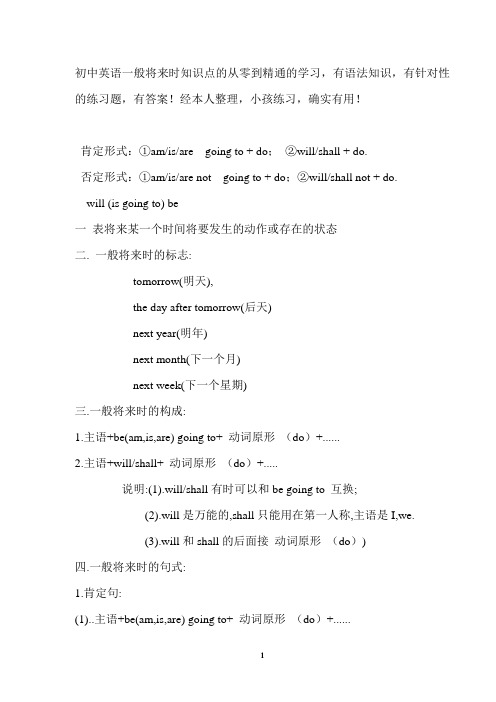
初中英语一般将来时知识点的从零到精通的学习,有语法知识,有针对性的练习题,有答案!经本人整理,小孩练习,确实有用!肯定形式:①am/is/are going to + do;②will/shall + do.否定形式:①am/is/are not going to + do;②will/shall not + do.will (is going to) be一表将来某一个时间将要发生的动作或存在的状态二. 一般将来时的标志:tomorrow(明天),the day after tomorrow(后天)next year(明年)next month(下一个月)next week(下一个星期)三.一般将来时的构成:1.主语+be(am,is,are) going to+ 动词原形(do)+......2.主语+will/shall+ 动词原形(do)+.....说明:(1).will/shall有时可以和be going to 互换;(2).will是万能的,shall只能用在第一人称,主语是I,we.(3).will和shall的后面接动词原形(do))四.一般将来时的句式:1.肯定句:(1)..主语+be(am,is,are) going to+ 动词原形(do)+......(2)..主语+will/shall+ 动词原形(do)+.....2.否定句:(1)..主语+be(am,is,are) not going to+ 动词原形(do)+......(2)..主语+will/shall not+ 动词原形(do)+.....3.一般疑问句:(1).Am/Is,Are+主语+going to+ 动词原形(do)+....(2).Will//shall+主语+ 动词原形(do)+...4.特殊疑问句:(1).What (Where, How...)+be (am,is,are)+主语+ going to + 动词原形(do)+...?(2). What (When,Where,How...) +will/shall+ 主语+ 动词原形(do)+...?二、基本结构:①be going to + do;②will+ do.三、否定句:在be动词(am, is, are)后加not或will后加not成won’t。
初中数学一般将来时专项语法讲解

初中数学一般将来时专项语法讲解一般将来时是表示将来某个时间要发生的动作或事件。
在初中数学中,很多时候我们需要描述将要发生的事情,使用一般将来时就尤为重要了。
I. 构成方法一般将来时由“will/shall + 动词原形”构成。
其中 shall 用得较少,will 是最主要的情态动词。
例如:I will go to school tomorrow.陈述句否定句构成如下:陈述句:I will see you tomorrow.否定句:I will not see you tomorrow.疑问句构成如下:一般疑问:Will you see me tomorrow?(肯定回答:Yes, I will.否定回答: No, I won't.)特殊疑问:What will you do tomorrow? (回答:I will go to school.)II. 动词用法将来时态只是时间状语,用途相当于陈述一件在未来某个时间会发生的事情,如“明天”,“下周”等。
* 表示未来的计划或决定:I will travel next month.* 表示意愿或承诺:I will help you with your homework.* 表示在未来一段时间内会经常发生的动作、或在未来发生的动作是一种惯:He will play basketball every morning.* 表示未来某个时间衔接发生的动作:I will wake up, and then I will brush my teeth.* 表示偶然发生的事情:There will be a party at my friend's house tomorrow.III. 练题1. 我明天早上6点起床。
2. 他下下个月去伦敦。
3. 他会在这个周末打篮球。
4. 我会帮你研究数学。
5. 当你到机场时,我会等你的。
答案:1. I will wake up at 6 tomorrow morning.2. He will go to London next month.3. He will play basketball this weekend.4. I will help you with studying mathematics.5. I will wait for you when you arrive at the airport.初中数学一般将来时是数学学习中的重要部分,希望这份语法讲解能帮助学生更好地掌握此知识点。
初二英语语法分析--一般将来时用法讲解
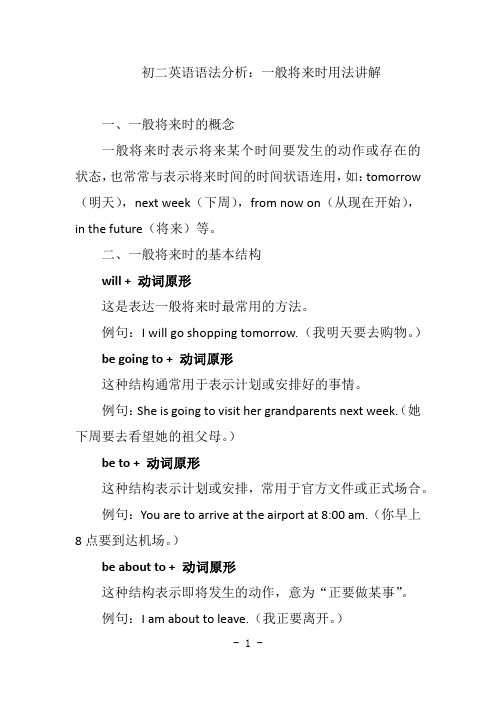
初二英语语法分析:一般将来时用法讲解一、一般将来时的概念一般将来时表示将来某个时间要发生的动作或存在的状态,也常常与表示将来时间的时间状语连用,如:tomorrow (明天),next week(下周),from now on(从现在开始),in the future(将来)等。
二、一般将来时的基本结构will + 动词原形这是表达一般将来时最常用的方法。
例句:I will go shopping tomorrow.(我明天要去购物。
)be going to + 动词原形这种结构通常用于表示计划或安排好的事情。
例句:She is going to visit her grandparents next week.(她下周要去看望她的祖父母。
)be to + 动词原形这种结构表示计划或安排,常用于官方文件或正式场合。
例句:You are to arrive at the airport at 8:00 am.(你早上8点要到达机场。
)be about to + 动词原形这种结构表示即将发生的动作,意为“正要做某事”。
例句:I am about to leave.(我正要离开。
)be due to + 动词原形这种结构表示某事预定或预期将要发生。
例句:The train is due to arrive at 5:00 pm.(火车预定下午5点到达。
)三、一般将来时的用法1表示将来的动作或状态例句:I will buy a new car next year.(明年我要买一辆新车。
)2表示将来的计划或安排例句:We are going to have a picnic this weekend.(我们这个周末要去野餐。
)3表示根据现有情况推测未来的可能性例句:It's going to rain soon.(很快就要下雨了。
)4表示命令、请求、建议等例句:You are to finish your homework before you go out.(你出去之前要把作业做完。
初中科学一般将来时
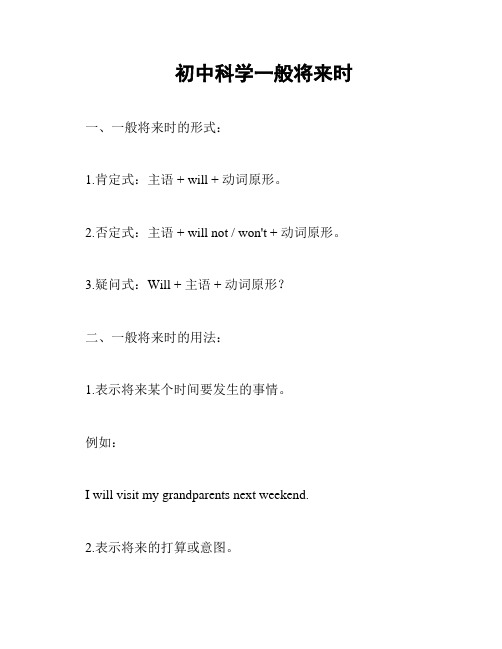
初中科学一般将来时一、一般将来时的形式:1.肯定式:主语 + will + 动词原形。
2.否定式:主语 + will not / won't + 动词原形。
3.疑问式:Will + 主语 + 动词原形?二、一般将来时的用法:1.表示将来某个时间要发生的事情。
例如:I will visit my grandparents next weekend.2.表示将来的打算或意图。
例如:He will study hard to pass the exam.3.表示一种预测或猜测。
例如:It will rain tomorrow.4.表示将来的惯或反复发生的动作。
例如:We will often go skating in winter. 三、一般将来时的注意点:1.将来时中有一些词,如:tomorrow, next week, next year 等,这些词本身已经表示将来的意思,所以一般将来时和这些词连用时,不需要在句中再用将来时。
例如:I will meet her tomorrow.2.在表示将来的时间的副词或短语中,要用一般现在时,而不是将来时。
例如:我会在他来的时候离开。
3.用于一般将来时的时间状语词:in the future(将来),tonight(今晚),next time(下次),soon(不久),tomorrow(明天),the day after tomorrow(后天),the day before yesterday(前天)等。
四、常见的一般将来时动词:1.动词接不定式,如:want, plan, hope, expect, promise, decide 等。
例如:I will help you with the housework.2.表示动作的持续或重复的动词,如:work, stay, live, play, swim 等。
例如:He will work hard in the future.例如:初中学生学习一般将来时,需要掌握以上的重点内容,同时注意词汇的积累和句型的多样化。
【初中英语】初中英语语法大全之一般将来时

【初中英语】初中英语语法大全之一般将来时【—之一般将来时】一般将来时表示将来某一时刻的将要发生动作或状态,或将来某一段时间内经常的动作或状态。
下面就是老师为同学们带来的对一般将来时的详细讲解,供同学们学习的参考。
总结顾名思义,通常将来时则表示将来某一时刻的将要出现动作或状态,或将来某一段时间内经常的动作或状态。
常常和则表示将来的时间状语属格,例如:tomorrow(明天),nextweek(下周),fromnowon(从现在已经开始);inthefuture(将来)等。
一、基本结构及用法1、will/shall+动词原形这种方法一般单纯地表示将来某个时间将要发生的动作或存在的状态。
will用于各种人称will常简略为'll,并与主语连写在一起,如:i'll,he'll,;shall只用于第一人称,在肯定句或否定句中表示将要或不会发生的事情或动作,在疑问句中可以表示建议或征求对方意见。
变否定句在will/shall后加not,缩略形式为won't;变疑问句把will/shall提到主语前。
比如:iwill/shallgotovisithimnextweek.下周我将回去造访他。
whattimeshallwegotheretomorrow?明天我们几点去那儿?2、begoingto动词原形(否定句、疑问句的变化彰显在be动词上)1)表示计划、打算、准备做的事。
比如:wearegoingtoputupabuildinghere.我们急于在这里砌一座楼。
howareyougoingtospendyourholidays?假期你准备怎样过?2)则表示即将出现或确实必须出现的事。
例如:ithinkitisgoingtosnow.我看要下雪了。
3、用现在展开时则表示常见考法对于通常将来时的考查,多以单选、句型切换或词语运用的形式考查学生在具体内容语境中灵活运用时态的能力。
在考试中,可以使大家推论与否该用通常将来时,以及如何恰当采用。
“一般将来时”的几种语法形式
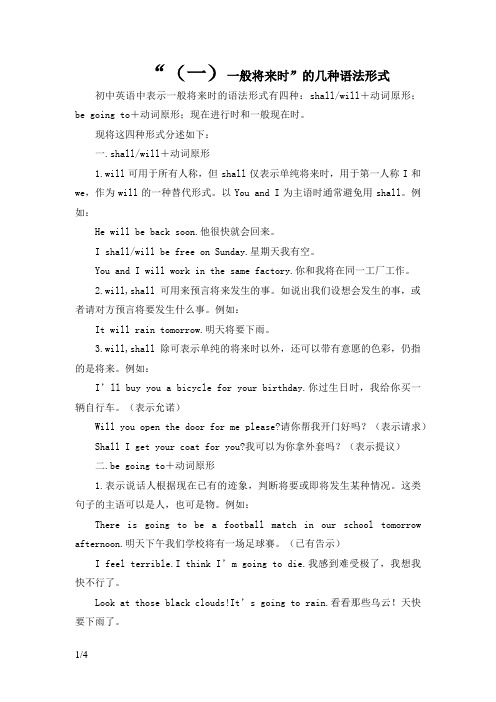
“(一)一般将来时”的几种语法形式初中英语中表示一般将来时的语法形式有四种:shall/will+动词原形;be going to+动词原形;现在进行时和一般现在时。
现将这四种形式分述如下:一.shall/will+动词原形1.will可用于所有人称,但shall仅表示单纯将来时,用于第一人称I和we,作为will的一种替代形式。
以You and I为主语时通常避免用shall。
例如:He will be back soon.他很快就会回来。
I shall/will be free on Sunday.星期天我有空。
You and I will work in the same factory.你和我将在同一工厂工作。
2.will,shall可用来预言将来发生的事。
如说出我们设想会发生的事,或者请对方预言将要发生什么事。
例如:It will rain tomorrow.明天将要下雨。
3.will,shall除可表示单纯的将来时以外,还可以带有意愿的色彩,仍指的是将来。
例如:I’ll buy you a bicycle for your birthday.你过生日时,我给你买一辆自行车。
(表示允诺)Will you open the door for me please?请你帮我开门好吗?(表示请求)Shall I get your coat for you?我可以为你拿外套吗?(表示提议)二.be going to+动词原形1.表示说话人根据现在已有的迹象,判断将要或即将发生某种情况。
这类句子的主语可以是人,也可是物。
例如:There is going to be a football match in our school tomorrow afternoon.明天下午我们学校将有一场足球赛。
(已有告示)I feel terrible.I think I’m going to die.我感到难受极了,我想我快不行了。
初中英语语法汇总(一般将来时)

初中英语语法汇总(一般将来时)初中英语语法汇总〔一般将来时〕一、一般将来时的定义一般将来时表示在如今看来即将要发生的动作或存在的状态。
常用时间副词tomorrow, soon或短语next year / week / month, in a few days, in the future, sometime 做状语。
二、一般将来时的基本用法及构成〔1〕一般将来时的基本用法是表示单纯的将来事实,由"will / shall + 动词原形'构成:〔shall只用于第一人称〕例句:We shall have a lot of rain next month. 下个月将下许多雨。
I think she will pass the exam. 我想他考试会及格的。
〔2〕"be going to+动词原形'用来表示事先考虑过的将要发生的动作以及已有迹象说明必将要发生的某事,意为"准备;就要'。
如:1. Were going to meet outside the school gate. 我们准备在校门口见面。
2. Look! Its going to rain. 瞧!快下雨了。
(3) 用"be to+动词原形'表示。
主要表示按打算或支配即将要发生的动作;有时也表示指令、禁止或可能性:He is to leave for Beijing tomorrow. 他确定明天去北京。
Tell him hes not to be back late. 告知他不准迟回。
(4) 用"be about to+动词原形'表示。
主要表示即将要发生的事:He is about to leave. 他即将要离开。
Sit down, everyone. The film is about to start. 大家坐好,电影马上就要开发始了。
注:该结构通常不与具体的时间状语连用:误:He is about to leave soon [tomorrow].另外,该结构在美国英语中还可表示"准备'(主要用于否认句):Im not about to lend him any more money. 我不准备再借给他任何钱。
初中英语一般将来时语法讲解
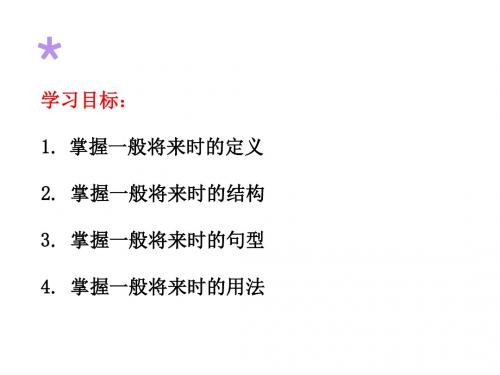
future
now
I will go back to my hometown next week. We will come to see you next Sunday.
2. 结构
(1)will +动词原形(主语是第一人称时也可用shall +动 词原形) (2)be(am, is, are) going to +动词原形
学习目标:
1. 掌握一般将来时的定义 2. 掌握一般将来时的结构
3. 掌握一般将来时的句型
4. 掌握一般将来时的用法
教学内容:
1. 一般将来时的定义 2. 一般将来时的结构
3. 一般将来时的句型
4. 一般将来时的用法
PART 01
定义和结构
1. 定义 表示将来某个时间要发生的动作或存在的状态,或 将来经常、反复发生的动作。
will/shall+动词原形 be going to +动词原形
表示较远的将来时间要发 生的事情 根据客观迹象表明马上要 发生的事情 没有“计划、准备”的意 思 表示近期就要发生的事情
表明说话者的主观意愿
含有“计划、准备”的意思
一、用词的适当形式填空。 1.He ____________(play )football after school . 2.It will be _____ (sun) tomorrow. 3.He __________ (be) a teacher in the future.
(4) “be +doing” 常与少量表示位置移动的动词,如go, come , start , move, leave等连用,用现在进行时表示 将来。 My aunt is leaving for Beijing next week.
初中一般将来时语法讲解

一般将来时语法讲解一、结构:1)will/shall+动词原形;2)be going to +动词原形句型转换:1. “shall/will+动词原形”结构的一般疑问句是将shall或will前移到句首,即“Shall/Will+主语+动词原形+其它?”。
其否定句是在shall 或will后加not.如:(1)Our teacher will come back very soon. (肯定句)(2)Our teacher won’t come back very soon. (否定句)(3)Will our teacher come back very soon?(一般疑问句)Yes,he will./No,he won’t. (4)When will your teacher come back ?(特殊疑问句)Our teacher will come back very soon.2. “be going to+动词原形”结构的一般疑问句是将be的相应形式前移到句首,即“Are/Is/Am+主语+going to+动词原形+其它?”。
其否定句是在be动词的相应形式后加not.如:(1)They are going to play football this afternoon.(肯定句)(2)They are not going to play football this afternoon. (否定句)(3)Are they going to play football this afternoon?(一般疑问句)(4) What are they going to do this afternoon?(特殊疑问句)They are going to play football this afternoon.二、用法:一般将来时表示将来某个时间要发生的动作,事情或存在的状态,也表示将来经常或反复发生的动作或事情。
初一英语语法:一般将来时(共12张PPT)

3) He is going to go fishing next week . What is he going to do next week ?
1. I’m going to __C__ some music this evening.
A. are,is B. is,is C. is,will be
B
7.Mother ____me a nice presrnt on my next birthday. A. is going to gives B. is going to give C. gives
B
8. B a concert next Satyrday?
小学英语 语法
一般将来时
我们也要学习
学习目标
1.一般将来时的概念。 2.一般将来时的构成。 3.与一般将来时连用的时间状语。 4.基本句型及其变化规则。 5.会灵活运用一般将来时(练习)。
一. 一般将来时的概念。
1.表示在将来某一时间将要发生的动作
或存在的状态, 2. 表示计划、打算或准备的事情。 1)They are going to the cinema.
天th…e day after tomorrow 后天
next week / Sunday / month / year下周/…
soon 很快 不久 in three days 三天后 in the future 将来
四. 基本句型
1. 肯定句:主语 + be going to + v.原型+其它 I am going to visit Australia. She is going to buy some clothes. They are going to play computer games.
初中英语语法——一般将来时
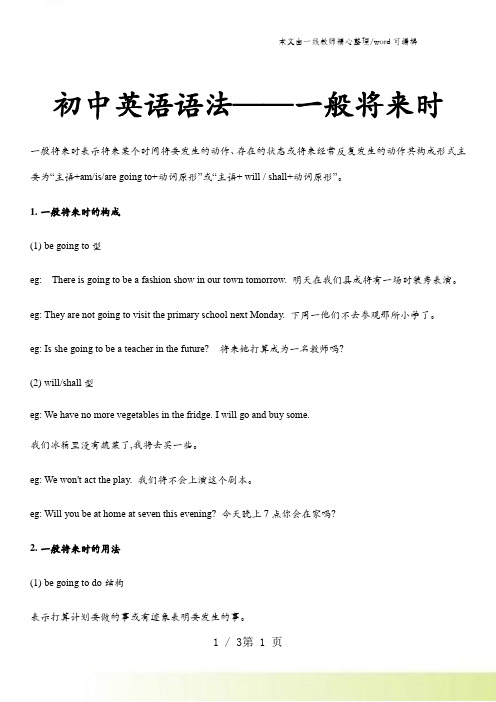
初中英语语法——一般将来时一般将来时表示将来某个时间将要发生的动作、存在的状态或将来经常反复发生的动作其构成形式主要为“主语+am/is/are going to+动词原形”或“主语+ will / shall+动词原形”。
1.一般将来时的构成(1)be going to型eg: There is going to be a fashion show in our town tomorrow. 明天在我们县成将有一场时装秀表演。
eg: They are not going to visit the primary school next Monday. 下周一他们不去参观那所小学了。
eg: Is she going to be a teacher in the future? 将来她打算成为一名教师吗?(2)will/shall型eg: We have no more vegetables in the fridge. I will go and buy some.我们冰箱里没有蔬菜了,我将去买一些。
eg: We won't act the play. 我们将不会上演这个剧本。
eg: Will you be at home at seven this evening? 今天晚上7点你会在家吗?2.一般将来时的用法(1)be going to do结构表示打算计划要做的事或有迹象表明要发生的事。
eg: I'm going to ski tomorrow.明天我要去滑雪。
(计划、打算)eg: It' s going to be a fine day tomorrow. 明天将会是个好天气。
(迹象表明要发生)(2) will /shall do 结构will/shall do 结构表示未经过事先考虑的意图,当主语是第一人称时用shall, will 可用于各种人称。
eg: How long will the work take? 这项工作要花多长时间? (推测)eg: From now on I will shall come for the newspapers every Monday.从现在起,我每周一都来拿报纸。
中考语法复习 一般将来时(附中考真题及解析)

中考语法复习一般将来时(附中考真题及解析)一、一般将来时1.概念:一般将来时表示将来某一时刻的动作或状态,或将来某一段时间内经常的动作或状态。
2.一般将来时的三种意义:预测(prediction):表示说话人认为将会发生某件事,即是表示猜测将来某事发生的可能性如:It will rain later.一会会下雨。
事先计划(future plan):表示说话人在头脑里已经决定好将来要做某件事如:My holiday is so long , and I am going to travel.意愿(willingness):表示说话人既不是预计某事将会发生,也不是预计经过考虑决定将做某事,而是在说话的时刻立即表明他将去做某事如:Someone is knocking at the door, I will go and open it.二、一般将来时结构一般将来时常常和表示将来的时间状语连用。
英式英语第一人称用shall,第二、三人称用will,而美式英语则不管什么人称,一律用will。
如:tomorrow(明天),next week(下周),from now on(从现在开始);in the future(将来)等。
⒈主语+ be going to do 表示主观的打算或计划。
⒉主语+ shall/will + do sth 其否定式shall not 和will not 的缩写式分别为shan't 和won't。
⒊ be 主语+ to do 表示客观安排或受人指示做某事或已安排好要在将来发生的事,是比较正式的用法。
如:They are to go on a strike on July 8.She is to be married next month.You are to finish your homework before you go to play.⒋主语+ be about to do,意为马上作某事,不能与tomorrow,next week 等表示明确将来时的时间状语连用,意思为“正要,马上就要”。
初中英语语法——一般将来时详细讲解
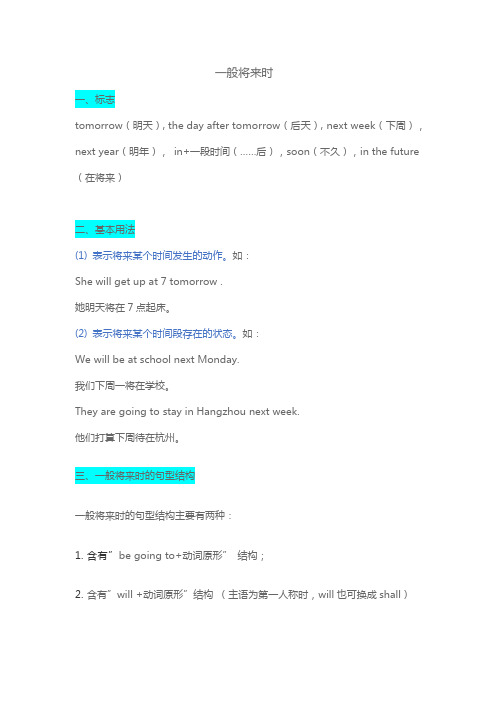
一般将来时一、标志tomorrow(明天), the day after tomorrow(后天), next week(下周),next year(明年),in+一段时间(……后),soon(不久),in the future (在将来)二、基本用法(1) 表示将来某个时间发生的动作。
如:She will get up at 7 tomorrow .她明天将在7点起床。
(2) 表示将来某个时间段存在的状态。
如:We will be at school next Monday.我们下周一将在学校。
They are going to stay in Hangzhou next week.他们打算下周待在杭州。
三、一般将来时的句型结构一般将来时的句型结构主要有两种:1.含有”be going to+动词原形”结构;2.含有”will +动词原形”结构(主语为第一人称时,will也可换成shall)(1)肯定句:She is going to buy some vegetables tomorrow morning . 她打算明天上午买一些蔬菜。
(2)否定句:在be动词后加not。
is和are可以和not缩写为isn't,aren't。
She isn’t going to buy any vegetables tomorrow morning . 她明天上午不去买蔬菜。
(3)一般疑问句及其答语:将be动词放在句子开头,且首字母要大写,句末用问号。
肯定回答:Yes,主语的相应代词+am/is/are.否定回答:No,主语的相应代词+am not /isn't/aren't.—Is she going to buy any vegetables tomorrow morning?她打算明天上午去买一些蔬菜吗?—Yes,she is./No,she isn't. 是的,她打算去。
初中英语语法一般将来时精华版

一般未来时◆一般未来时主要有以下几种表现形式由助动词 shall或will加动词原形组成,shall用于第一人称,will用于第二、三人称。
除英外国的说英语的国家,在陈说句中,即便在第一人称一般也用will,在英国也有这种趋向。
在口语中,常用shall, will的缩写形式为’ ll,如:I’ ll, you’ll等。
Shall not的缩写式为:shan’ t, will not的缩写式为:won’ t.一定句: I/We shall/will go.You/He/She/They Will go.否认句: I/We shall/will not go.You/He/She/They Will not go.疑问句: Shall I/we go?Will you/he/she/they go?◆一般未来时用法( 1)一般未来时表示将要发生的动作或状况。
比如: I will(shall) arrive tomorrow.我明日到。
Will you be free tonight?你今夜有空吗We won ’t (shan ’t) be busy this evening.我们今夜不忙。
(2)在一般未来时的句子中,有时有表示未来时间的状语,有时没有时间状语,这时要从意思上判断能否指未来的动作或状况。
比如:Will she come?她(会)来吗We ’ ll only stay for two weeks.我们只待两礼拜。
The meeting won’t last long.会开不了多久。
(3)在以第一人称 I 或 we 作主语的问句中,一般使用助动词 shall ,这时或是征采对方的建议 (a) ,或是咨询一个状况 (b) :a. Where shall we meet?我们在哪儿碰头b. Shall we have any classes tomorrow?明日我们有课吗在这种问句中,最近几年来也有许多人用will,特别是在美国。
- 1、下载文档前请自行甄别文档内容的完整性,平台不提供额外的编辑、内容补充、找答案等附加服务。
- 2、"仅部分预览"的文档,不可在线预览部分如存在完整性等问题,可反馈申请退款(可完整预览的文档不适用该条件!)。
- 3、如文档侵犯您的权益,请联系客服反馈,我们会尽快为您处理(人工客服工作时间:9:00-18:30)。
初中英语一般将来时知识点的从零到精通的学习,有语法知识,有针对性的练习题,有答案!经本人整理,小孩练习,确实有用!肯定形式:① am/is/are going to + do; ②will/Shall + do.否定形式:① am/is/are not going to + do; ②will/shall not + do.will (is going to) be一表将来某一个时间将要发生的动作或存在的状态二. 一般将来时的标志:tomorrow(明天),the day after tomorrow(后天)n ext year(明年)next month(下一个月)next week(下一个星期)三.一般将来时的构成:1. 主语+be(am,is,are) going to+ 动词原形(do)+ ..2. 主语+will/shall+动词原形(do)+..…说明:(1).will/shall 有时可以和be going to 互换;(2).will 是万能的,shall 只能用在第一人称,主语是I,we.⑶.will和shall的后面接动词原形(do))四.一般将来时的句式:1. 肯定句:(1)..主语+be(am,is,are) going to+ 动词原形 ..... (do)+(2) ................................................................. ..主语+will/shall+ 动词原形(do)+ ............................................................2. 否定句:(1) ..主语+be(am,is,are) notgoing to+ 动词原形(do) + .....(2) ..主语+will/ShaIl n ot+ 动词原形 (do) +..…3. 一般疑问句:(1) .Am∕ls,Are+ 主语+goi ng to+ 动词原形(do) +....(2).Will//shall+ 主语+ 动词原形(do) +...4. 特殊疑问句:(1).What (Where, How...)+be (am,is,are)+主语+ goi ng to + 动词原形(do)+...?(2) . What (When,Where,How...) +will/shall+ 主语+ 动词原形(do) +...?二、基本结构:① be going to + do; ②will+ do.三、否定句:在be动词(am, is, are 后加not或WiIl后加not成won' t。
例如:I' m going to have a picnic this afternoon.→ I' m not going to have a picnic this afternoon.四、一般疑问句:be 或will/shall 提到句首,some 改为any,and 改为or,第一二人称互换。
例如:We are going to go on an outing this weekend.→ Are you going to go on an outing this weekend?五、对划线部分提问。
一般情况,一般将来时的对划线部分有三种情况。
1. 问人。
Who例如:I' m going to New York soon.→Who' s going to New York soon.2. 问干什么。
What , do.例如:My father is going to watch a race with me this afternoon.→What is your father going to do with you this afternoon.3. 问什么时候。
When.例如:She' s going to go to bed at nine. →When is she going to bed?一表将来某一个时间将要发生的动作或存在的状态二. 一般将来时的标志:tomorrow(明天),the day after tomorrow(后天)n ext year(明年)next month(下一个月)next week(下一个星期)三.一般将来时的构成:1. 主语+be(am,is,are) going to+⅛词原形+例如:(1)」am going to play football tomorrow.明天我将要踢足球.(2).She is going to WatCh a movie the day after tomorrow后天她要看一场电影.2. 主语+will∕shall+动词原形+..…** *** 说明:(1).will/shall 有时可以和be going to 互换;⑵.will是万能的,shall只能用在第一人称,主语是I,we.(3).will和shall的后面接动词原形)例如:(1)」shall/will go to Beijing next month.(I will=I'll)下个月我将要去北京.(2) .You will come to see me tomorrow.(you will=you'll) 明天你将要来看我.(3) .She will read English tomorrow morning.(She will=She'll) 明天早上她将要读英语.四.句一般将来时的式:1. 肯定句:(1) ..主语+be(am,is,are) going to+动词原形+(2) ..主语+will/Shal1+动词原形+..…例句和上面一样,就不举了.2. 否定句:(1)..主语+be(am,is,are) not going to+动词原形+ .....例如:(A): I am not going to play basketball tomorrow. 明天我不将踢足球.(B). She is not/isn't going to visit Shanghai next year. 明年她不将参观上海.(2)..主语+will/shall not+ 动词原形+..…(A) . I shall notgo to school the day after tomorrow。
后天我不将上学了(B) . I will not write my homework this evening.(will notl=I won't) 今晚我不将写作业(C) . She will not see a movie next week.(will not=won't) 下个星期她将不看一场电影.3. 一般疑问句:(1).Am∕ls,Are+ 主语+goi ng to+动词原形+.... 例如(A). --Am I going to see my grandfather tomorrow?明天我将去看我的爷爷吗?--Yes,you are.是的,你将去.(B).-- Are you going to listening to the tape tomorrow? 明天你将听录音带吗?---No,l am not.不,我不将.(C) . --Is she going to Beijing next year? 明年我将去北京吗?--Yes,she is. 是的,她将.(2).Will//shall+ 主语+动词原形+. . .例如(A). --Shall we play volleyball next class? 下一节课我们将打排球吗?--Yes,you will. 是的,你们将.(B). --Will you come here next week? 下个星期你将来这儿吗?--Yes,l will. 是的,我将.(C).--Will she teach us this term? 这学期,她将教我们吗?--Yes,she will. 是的,她将.4. 特殊疑问句:(1).What(Where,How…)+be(am,is,are)■主语+goi ng to+动词原形+...? 例如:(A).--What are you going to do tomorrow? 明天你将要做什么? --l'mgoing to the park? 我将要去动物园.(B).--Where are you going to swim? 你将要去哪儿游泳?--l'm going to swim in the river.(2). What(When,Where,How...)+主语+动词原形+...?例如:(A).- --What will you do next week ?下个星期你将要做什么?---I will do my homework 。
我将要做作业. (B).--How will she come here tomorrow? 明天她将要怎么来这儿?--She will come here by bus。
她将要乘公共汽车来这儿.补充说明有些词如:go(去),come(来),leave离开),Start(开始),arrive等用现在进行时表示将来时.例如: (1) She is coming here tomorrow.她明天将要来这儿.(2) When are you leaving here? 你什么时间将要离开这儿?区别"Be going to+动词原形+..."表示一个事先考虑好的意图,,相当于文中的"打算,计划,准备"例女口:(1)」am going to SPend my holiday in Beiiing.(这里不能用will) 我打算在北京度假.(2).Where are you going to Spend your holiday? 你将要到哪儿度假?3. 客观难以改变的事实,用will, 而不用be going to .例如: (1).It will rain tomorrow. 明天将要下雨.(2).It will be TeacherS' Day the day after tomorrow. 后天将是教师节.(3) .My birthday will come. 我生日将要到了.“will”句型与“ be going to”句型,前者表示纯粹将来,后者表示打算、计划、准备做的事情,更强调主语的主观意愿。
